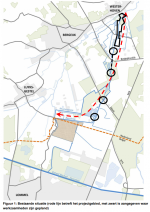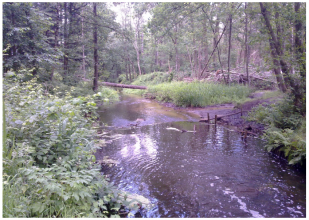Case study:Herinrichting Beekloop: Difference between revisions
No edit summary |
No edit summary |
||
| (11 intermediate revisions by one other user not shown) | |||
| Line 1: | Line 1: | ||
{{Case study status | {{Case study status | ||
|Approval status= | |Approval status=Approved | ||
}} | }} | ||
{{Location | {{Location | ||
| Line 25: | Line 25: | ||
{{Case study image | {{Case study image | ||
|File name=Beekloop Project Map.PNG | |File name=Beekloop Project Map.PNG | ||
|Caption=Situatie herinrichting Beekloop | |Caption=Situatie herinrichting Beekloop, bron: http://edepot.wur.nl/396172 | ||
}} | }} | ||
{{Image gallery end}} | {{Image gallery end}} | ||
| Line 31: | Line 31: | ||
{{Toggle content start}} | {{Toggle content start}} | ||
{{Case study subcatchment}} | {{Case study subcatchment}} | ||
{{Site}} | {{Site | ||
{{Project background}} | |Name='t Schut | ||
{{Motivations}} | |WFD water body code=NL27 BO 3 2 | ||
{{Measures}} | |WFD (national) typology=R4 | ||
|Pre-project morphology=Sterk veranderd | |||
|Reference morphology=R4 | |||
|Heavily modified water body=Yes | |||
|Site designation=Netherlands - Natuurbeschermingswet | |||
|Local site designation=Landbouw/Natuur | |||
|Protected species present=No | |||
|Invasive species present=No | |||
|Dominant hydrology=Langzaamstromende bovenloop | |||
|Dominant substrate=Zand | |||
|River corridor land use=Landbouw/Natuur | |||
|Average bankfull channel width category=5 - 10 m | |||
|Average bankfull channel depth category=0.5 - 2 m | |||
|Avrg1 bankfull channel depth=0.1 - 1 m | |||
|Mean discharge category=0.1 - 1.0 m³/s | |||
|Mn discharge=0.3 | |||
|Average channel gradient category=0.001 - 0.01 | |||
|Avrg channel gradient=0.00134 | |||
}} | |||
{{Project background | |||
|Reach length directly affected=4.4 | |||
|Project started=2010/01/01 | |||
|Total cost category=10 - 50 k€ | |||
|Funding sources=Provincie; Waterschap de Dommel | |||
|Supplementary funding information=De totale kosten van het project bestaan uit een deel traditioneel beekherstel en een deel bouwen met natuur. Gecombineerd zijn de kosten respectievelijk ongeveer €14.000 + €28.000 = €42.000. | |||
}} | |||
{{Motivations | |||
|Specific mitigation=KRW, Ecologie | |||
|Other motivation=Waterverdeling | |||
}} | |||
{{Measures | |||
|Bank and bed modifications measure=Dood hout, Vispassages | |||
|Floodplain / River corridor=Beschaduwing | |||
|Social measures=Afspraken met belanghebbende waterverdeling | |||
}} | |||
{{Hydromorphological quality elements header}} | {{Hydromorphological quality elements header}} | ||
{{Hydromorphological quality element table row | |||
|Element=Width & depth variation | |||
|Monitored before=Yes | |||
|Monitored after=Yes | |||
|Qualitative monitoring=Yes | |||
|Quantitative monitoring=Yes | |||
|Control site used=No | |||
|Result=Improvement | |||
}} | |||
{{Hydromorphological quality element table row | |||
|Element=Flow velocities | |||
|Monitored before=Yes | |||
|Monitored after=Yes | |||
|Qualitative monitoring=Yes | |||
|Quantitative monitoring=Yes | |||
|Control site used=No | |||
|Result=Improvement | |||
}} | |||
{{End table}} | {{End table}} | ||
{{Biological quality elements header}} | {{Biological quality elements header}} | ||
{{Biological quality element table row | |||
|Element=Fish | |||
|Monitored before=Yes | |||
|Monitored after=Yes | |||
|Qualitative monitoring=Yes | |||
|Quantitative monitoring=Yes | |||
|Control site used=No | |||
|Result=Improvement | |||
}} | |||
{{Biological quality element table row | |||
|Element=Macrophytes | |||
|Monitored before=Yes | |||
|Monitored after=Yes | |||
|Qualitative monitoring=Yes | |||
|Quantitative monitoring=Yes | |||
|Control site used=No | |||
|Result=Improvement | |||
}} | |||
{{End table}} | {{End table}} | ||
{{Physico-chemical quality elements header}} | {{Physico-chemical quality elements header}} | ||
{{Physico-chemical quality element table row | |||
|Element=Temperature | |||
|Monitored before=Yes | |||
|Monitored after=Yes | |||
|Qualitative monitoring=Yes | |||
|Quantitative monitoring=Yes | |||
|Control site used=No | |||
}} | |||
{{Physico-chemical quality element table row | |||
|Element=Specific synthetic pollutants | |||
|Monitored before=Yes | |||
|Monitored after=Yes | |||
|Qualitative monitoring=Yes | |||
|Quantitative monitoring=Yes | |||
|Control site used=No | |||
|Result=Improvement | |||
}} | |||
{{Physico-chemical quality element table row | |||
|Element=Salinity | |||
|Monitored before=Yes | |||
|Monitored after=Yes | |||
|Qualitative monitoring=Yes | |||
|Quantitative monitoring=Yes | |||
|Control site used=No | |||
}} | |||
{{Physico-chemical quality element table row | |||
|Element=Transparency | |||
|Monitored before=Yes | |||
|Monitored after=Yes | |||
|Qualitative monitoring=Yes | |||
|Quantitative monitoring=Yes | |||
|Control site used=No | |||
|Result=Improvement | |||
}} | |||
{{Physico-chemical quality element table row | |||
|Element=PH | |||
|Monitored before=Yes | |||
|Monitored after=Yes | |||
|Qualitative monitoring=Yes | |||
|Quantitative monitoring=Yes | |||
|Control site used=No | |||
}} | |||
{{Physico-chemical quality element table row | |||
|Element=Oxygen balance | |||
|Monitored before=Yes | |||
|Monitored after=Yes | |||
|Qualitative monitoring=Yes | |||
|Quantitative monitoring=Yes | |||
|Control site used=No | |||
|Result=No change | |||
}} | |||
{{Physico-chemical quality element table row | |||
|Element=Nutrient concentrations | |||
|Monitored before=Yes | |||
|Monitored after=Yes | |||
|Qualitative monitoring=Yes | |||
|Quantitative monitoring=Yes | |||
|Control site used=No | |||
|Result=Improvement | |||
}} | |||
{{End table}} | {{End table}} | ||
{{Other responses header}} | {{Other responses header}} | ||
Latest revision as of 11:27, 13 September 2019
Project overview
| Status | Complete |
|---|---|
| Project web site | |
| Themes | Environmental flows and water resources, Fisheries, Hydromorphology, Land use management - agriculture |
| Country | Netherlands |
| Main contact forename | Ineke |
| Main contact surname | Barten |
| Main contact user ID | User:MaritJob |
| Contact organisation | STOWA |
| Contact organisation web site | http://www.stowa.nl/contact |
| Partner organisations | Waterschap De Dommel |
| Parent multi-site project | |
| This is a parent project encompassing the following projects |
No |
Project summary
De Beekloop is voor het grootste deel gegraven door de mens en ontspringt in de bossen tussen Aalst en Hezen en uitkomt in de Kleine Dommel ter hoogte van natuurgebied Hulsterbroek. De waterloop ligt bij de overgang van het Kempisch plateau in België tot een lager gelegen gebied in Noord-Brabant, wat resulteert in een relatief groot bodemverhang. De beekloop is betrokken geweest bij vele beekherstel projecten tussen 2010 en 2015, waarbij sommige projecten geclassificeerd kunnen worden als traditioneel beekherstel (TB) en sommige projecten met de focus op Bouwen met Natuur (BmN). Voor trajecten (152 t/m 159) zijn zowel BmN werkzaamheden uitgevoerd als traditioneel beekherstel (Factsheet NL27_BO_3_2). De belangrijkste BmN maatregel die hier is toegepast is het toevoegen van dood hout. Dit is gedaan over een totale lengte van 750 meter ter hoogte van stuw 't Schut. Daarnaast zijn er ook 6 vispassages aangelegd en is er beschaduwing toegepast.
Monitoring surveys and results
Lessons learnt
Image gallery

|
Catchment and subcatchment
Site
Project background
Cost for project phases
Supplementary funding informationDe totale kosten van het project bestaan uit een deel traditioneel beekherstel en een deel bouwen met natuur. Gecombineerd zijn de kosten respectievelijk ongeveer €14.000 + €28.000 = €42.000.
Reasons for river restoration
Measures
MonitoringHydromorphological quality elements
Biological quality elements
Physico-chemical quality elements
Any other monitoring, e.g. social, economic
Monitoring documents
Additional documents and videos
Additional links and references
Supplementary InformationEdit Supplementary Information
| |||||||||||||||||||||||||||||||||||||||||||||||||||||||||||||||||||||||||||||||||||||||||||||||||||||||||||||||||||||||||||||||||||||||||||||||||||||||||||||||||||||||||||||||||||||||||||||||||||||||||||||||||||||||||||||||||||||||||||||||||||||||||||||||

